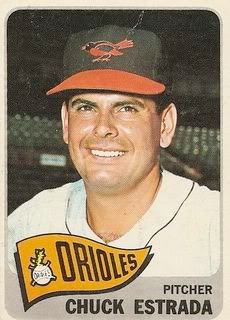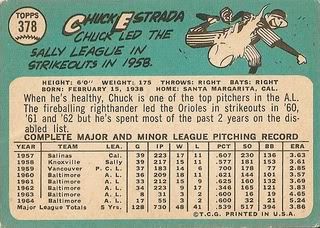
Fun Facts about Chuck Estrada:
-A native of San Luis Obispo, CA, Chuck signed with the Braves as a teenager in 1956.
-Milwaukee sent him to the Orioles in 1958, and he made his major league debut on April 21, 1960, striking out five Senators in two scoreless innings of relief.
-Baltimore soon moved Estrada to the rotation, and the results were encouraging to say the least. He went 18-11 to tie Jim Perry for the American League lead in wins, also led the loop with seven hits allowed per nine innings, and had a 3.58 ERA. He paced the O's with 12 complete games and 144 strikeouts, though his 101 walks were less auspicious. He was chosen as an All-Star and as The Sporting News' Pitcher of the Year, and finished second to teammate Ron Hansen in Rookie of the Year balloting. He even received eight percent of the A.L. MVP vote!
-There was no sophomore jinx for Chuck, who followed up his rookie effort with a 15-9 record and a 3.69 ERA. He again lead the league with 6.8 H/9 IP, but also topped all A.L. pitchers with 132 walks allowed. Once more he paced Oriole pitchers with 160 strikeouts.
-On June 6, 1961, he struck out a dozen Angels in a two-hit shutout. He also walked six, but who's counting?
-The Birds averaged just 3.38 runs per game in Estrada's 1962 starts, and he led the league in losses. His record tumbled to 9-17 despite a decent 3.83 ERA. He did set a career high with 165 strikeouts, but issued 121 free passes.
-The discovery of a bone spur and chips in his right elbow in early June brought the hurler's 1963 season to a premature end. He threw only 54.2 innings the following year with a 5.27 ERA, and spent all of 1965 at AAA Rochester.
-Chuck's major league career came to an unglamorous end with short and ineffective stints with the Cubs in 1966 and Mets in 1967. In his final pro season, he pitched for the single-A Visalia Mets in 1969 and managed the club for a portion of the year.
-In parts of seven seasons he was 50-44 with a 4.07 ERA.
-Estrada served as pitching coach for the Rangers (1973), Padres (1978-1981), and Indians (1983).



No comments:
Post a Comment